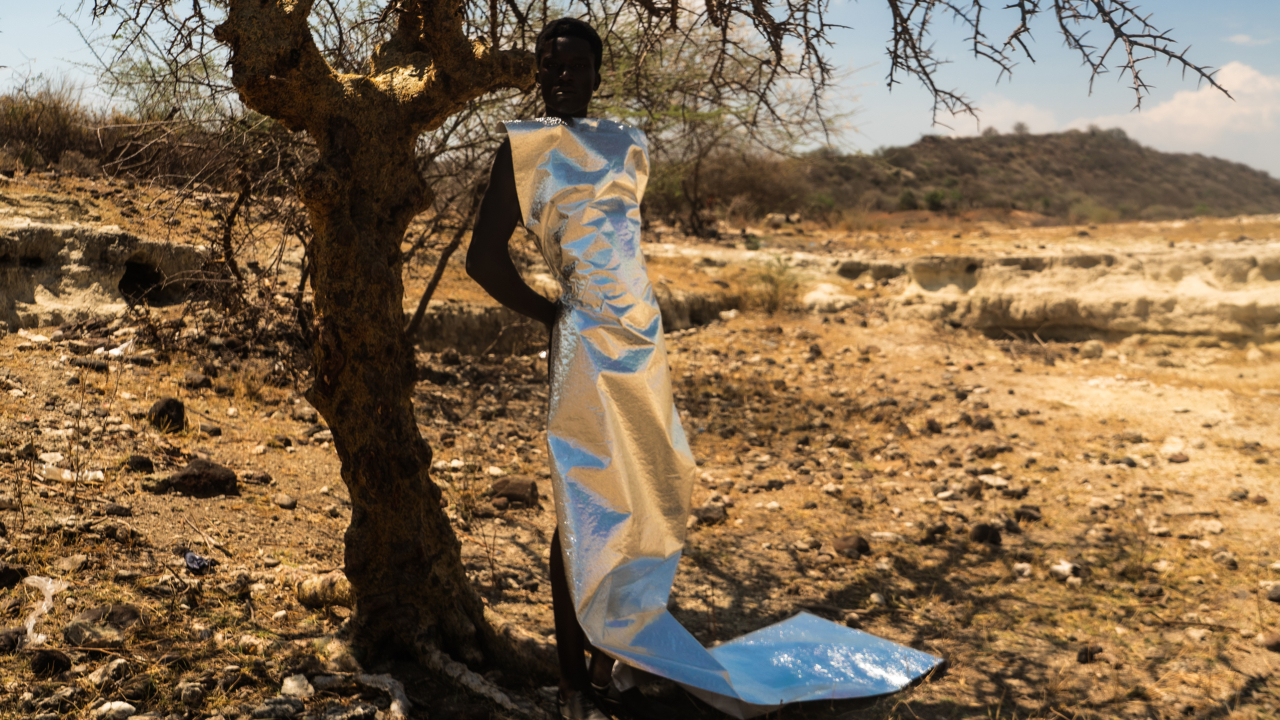

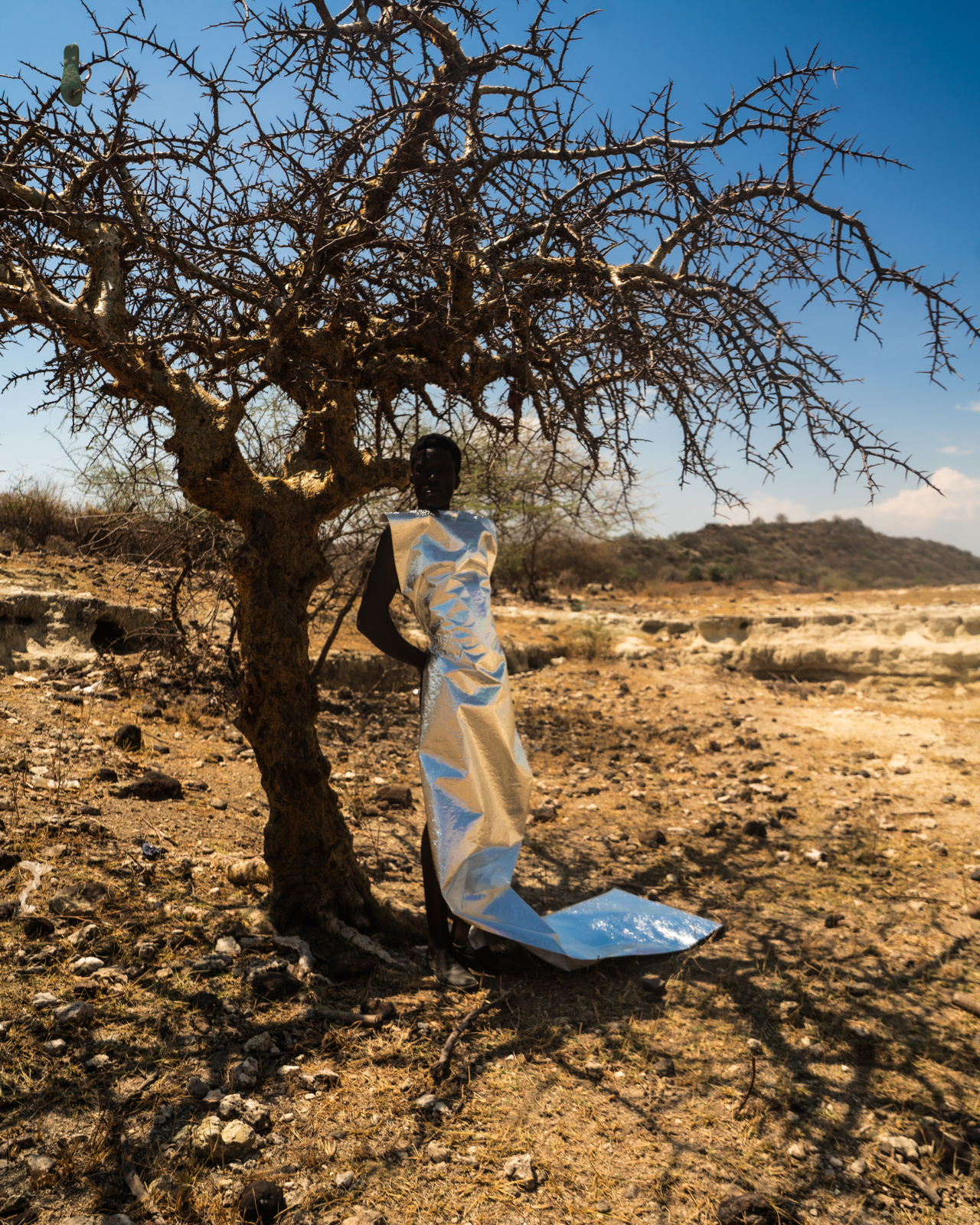
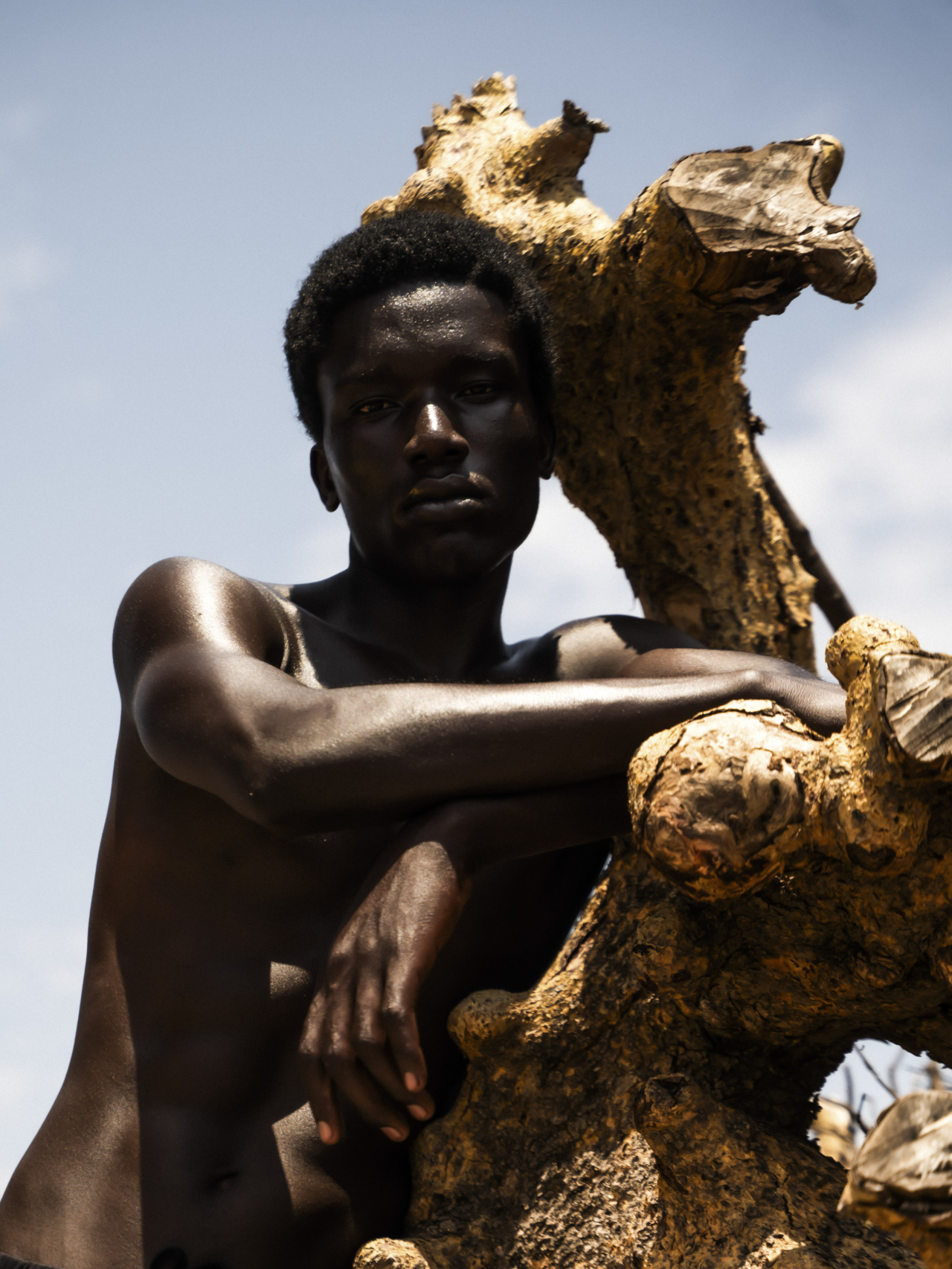
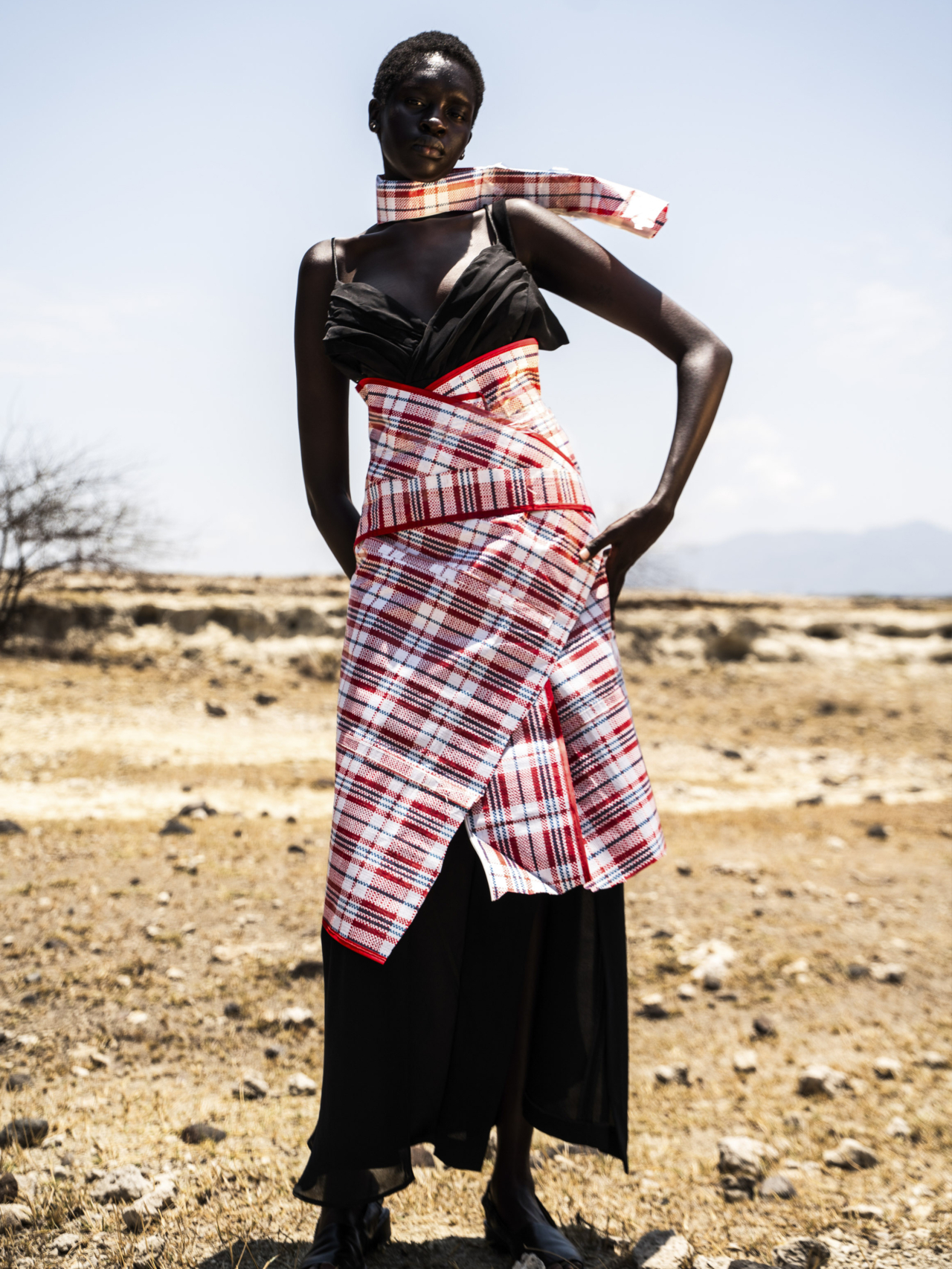
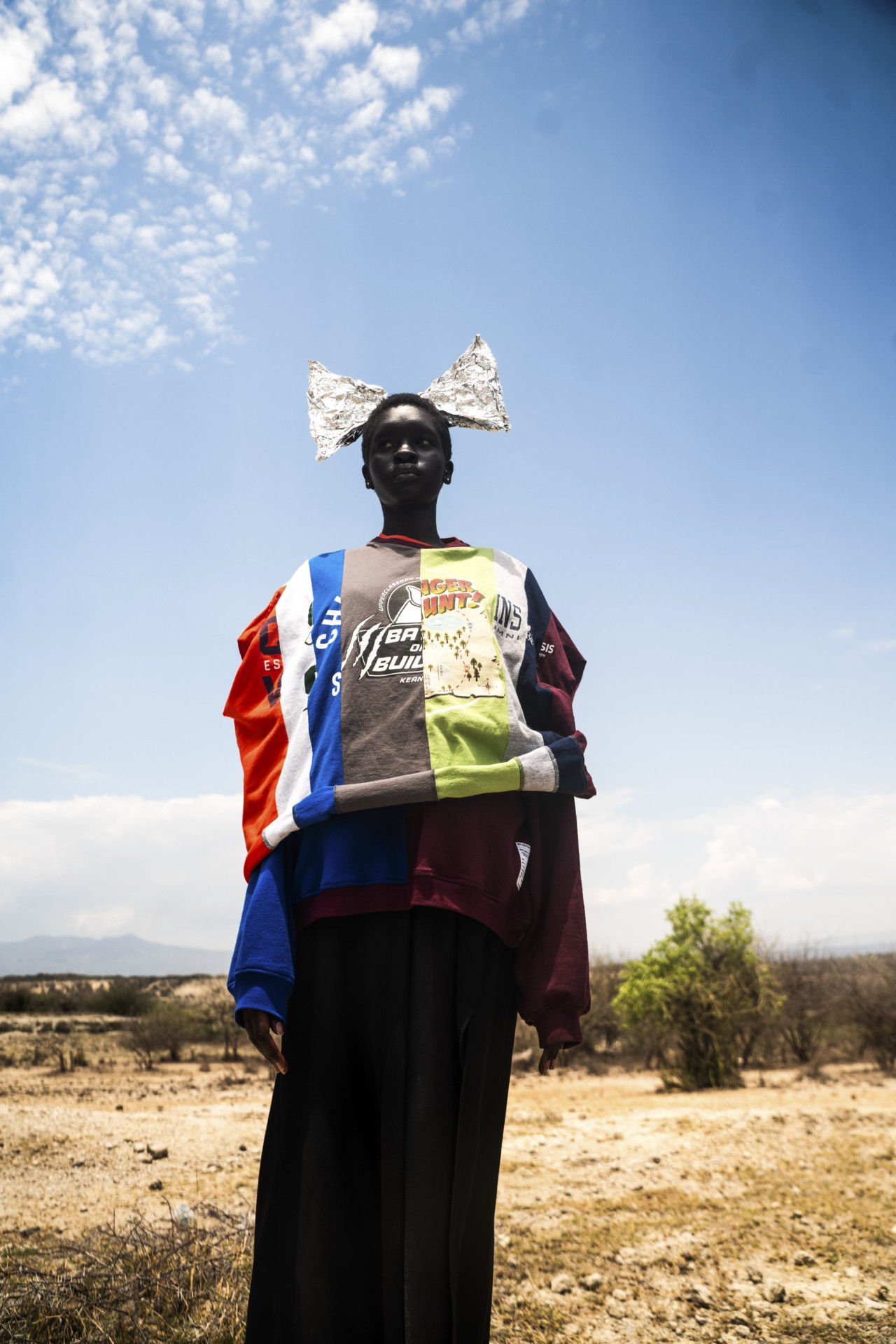
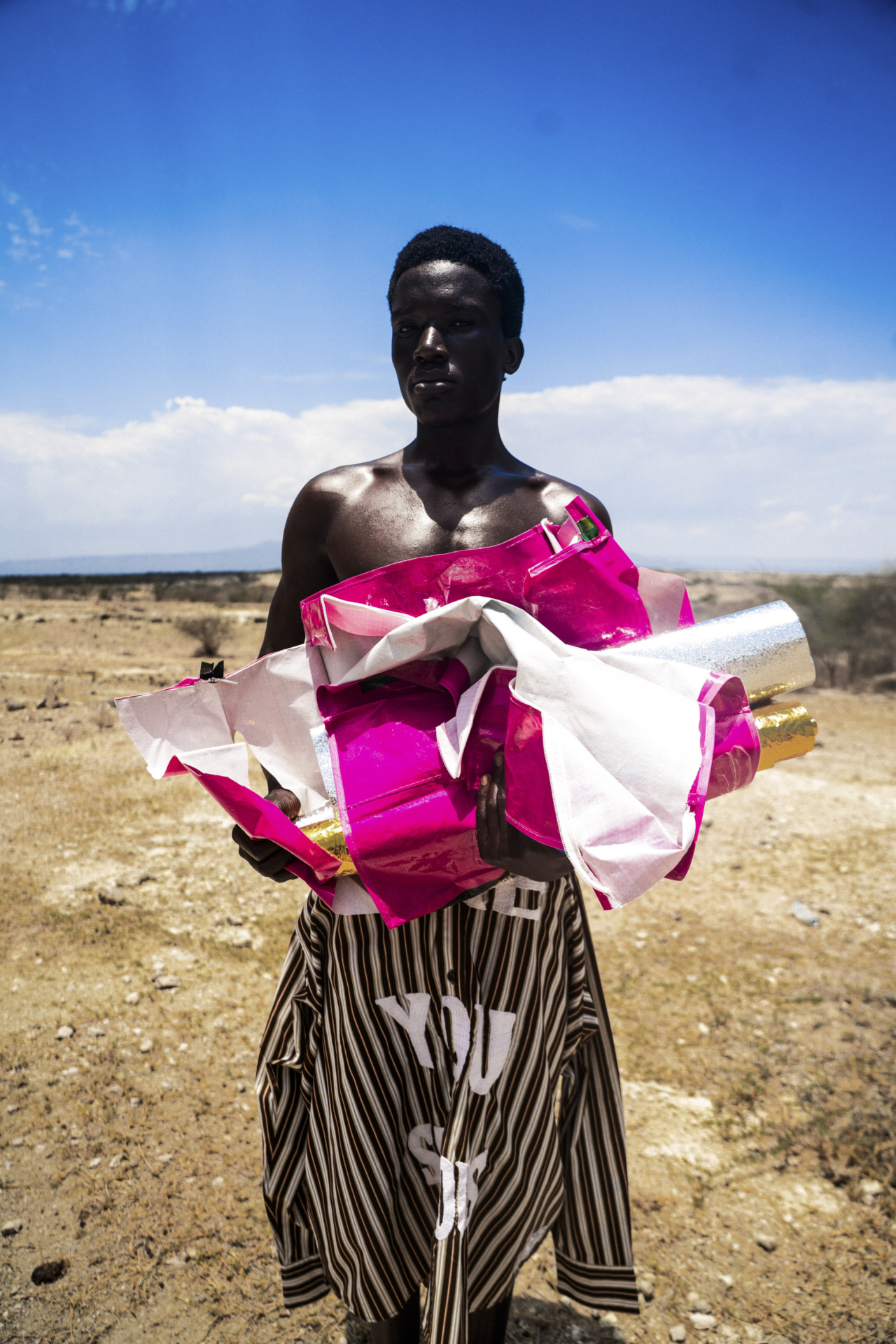
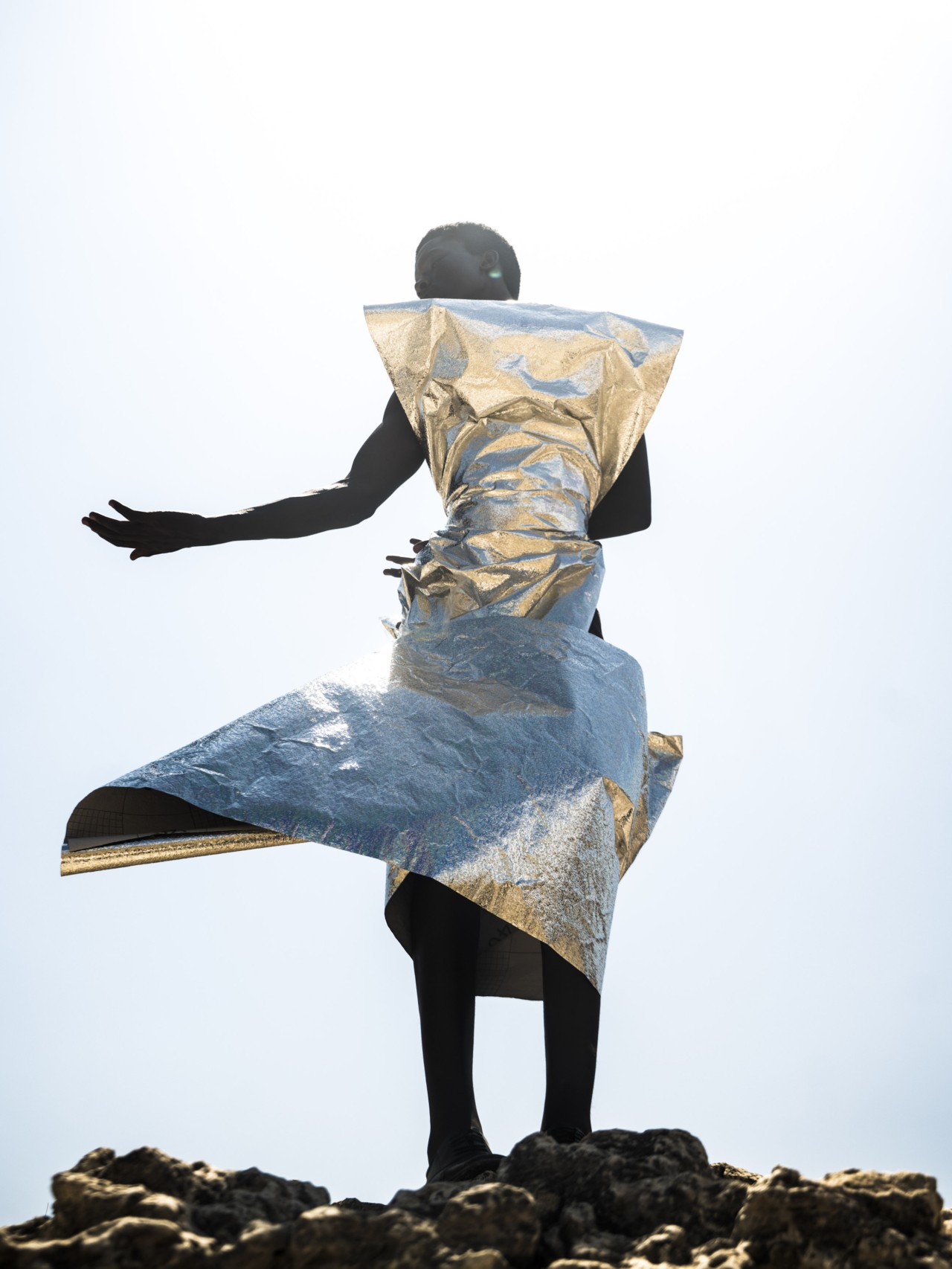
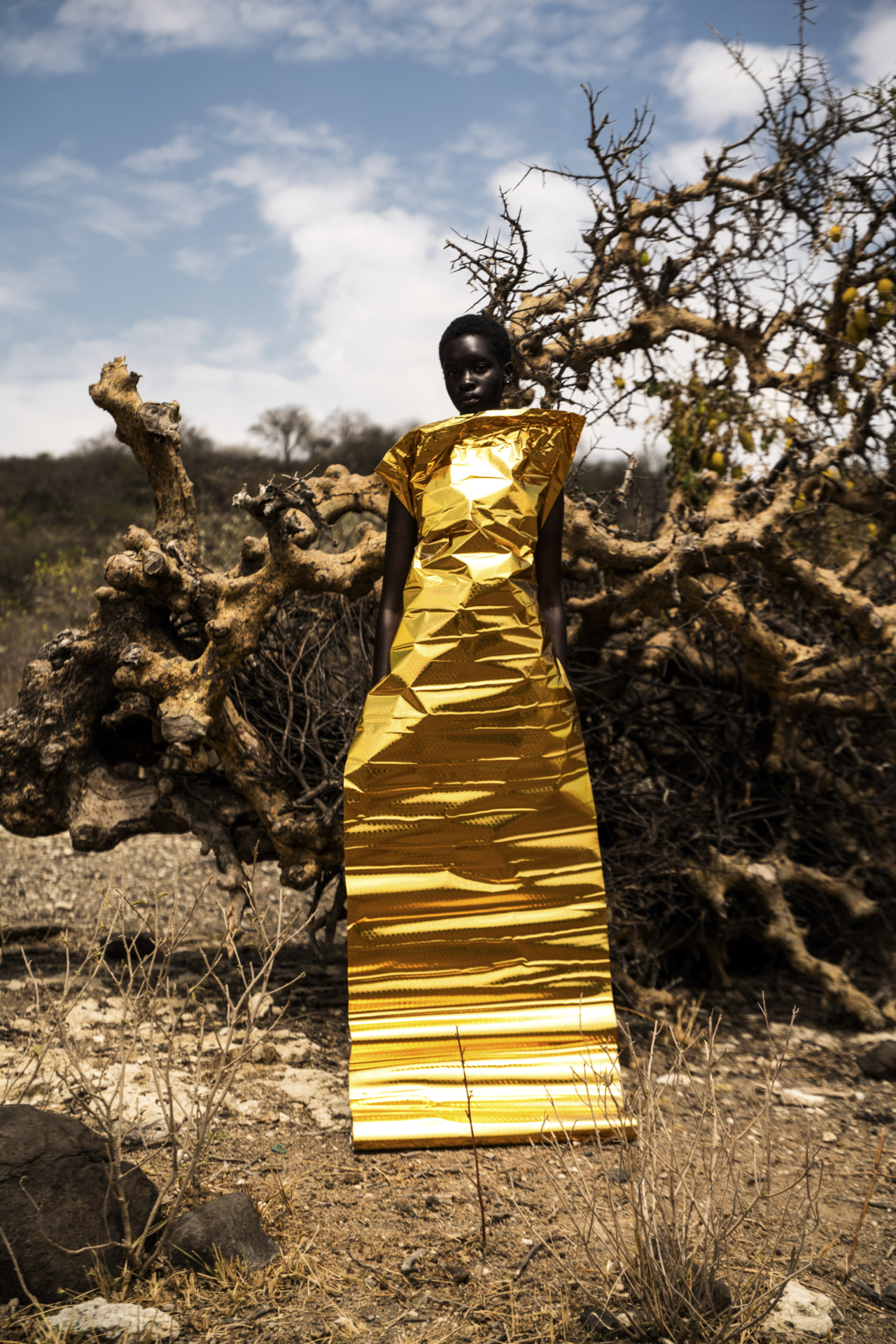
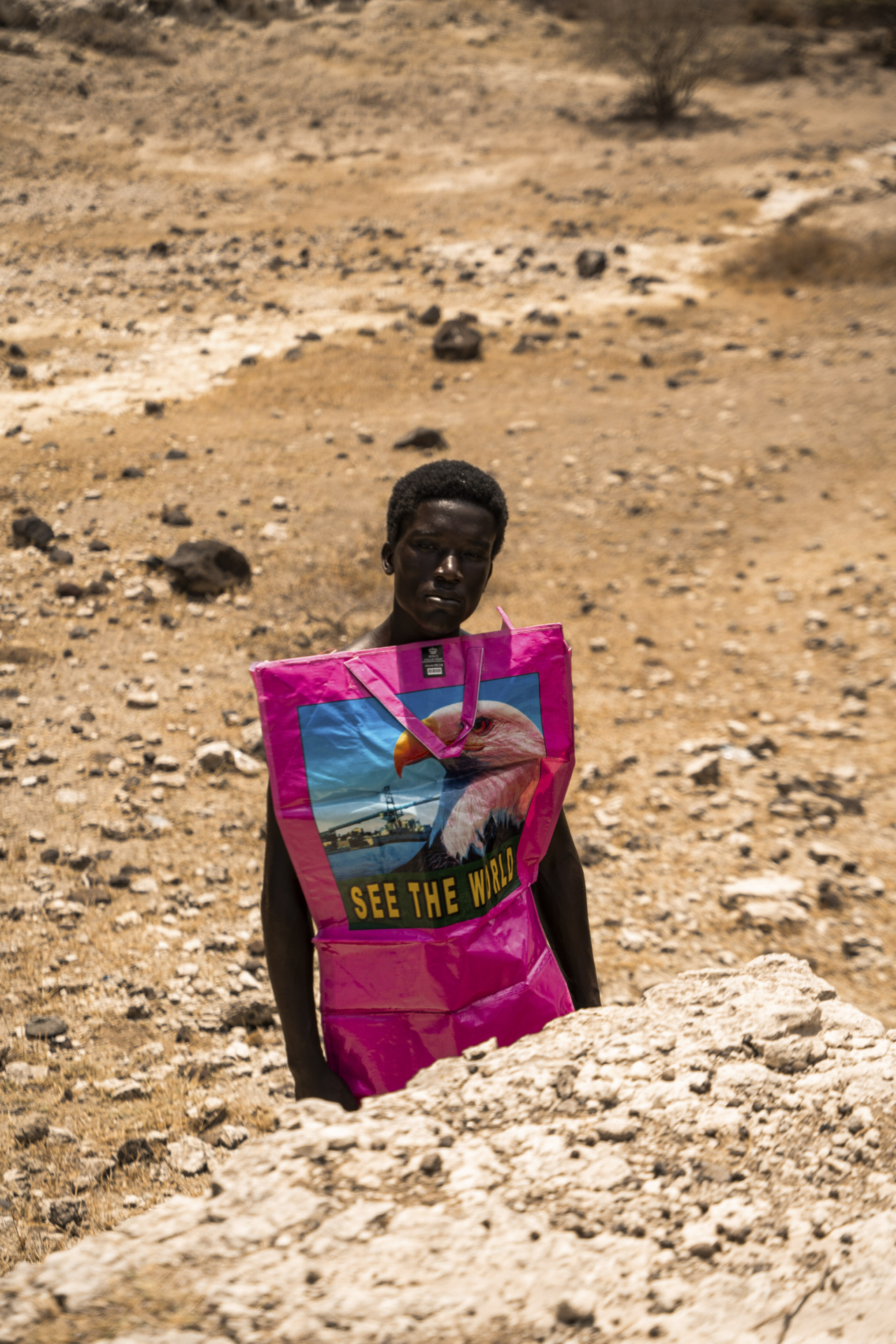
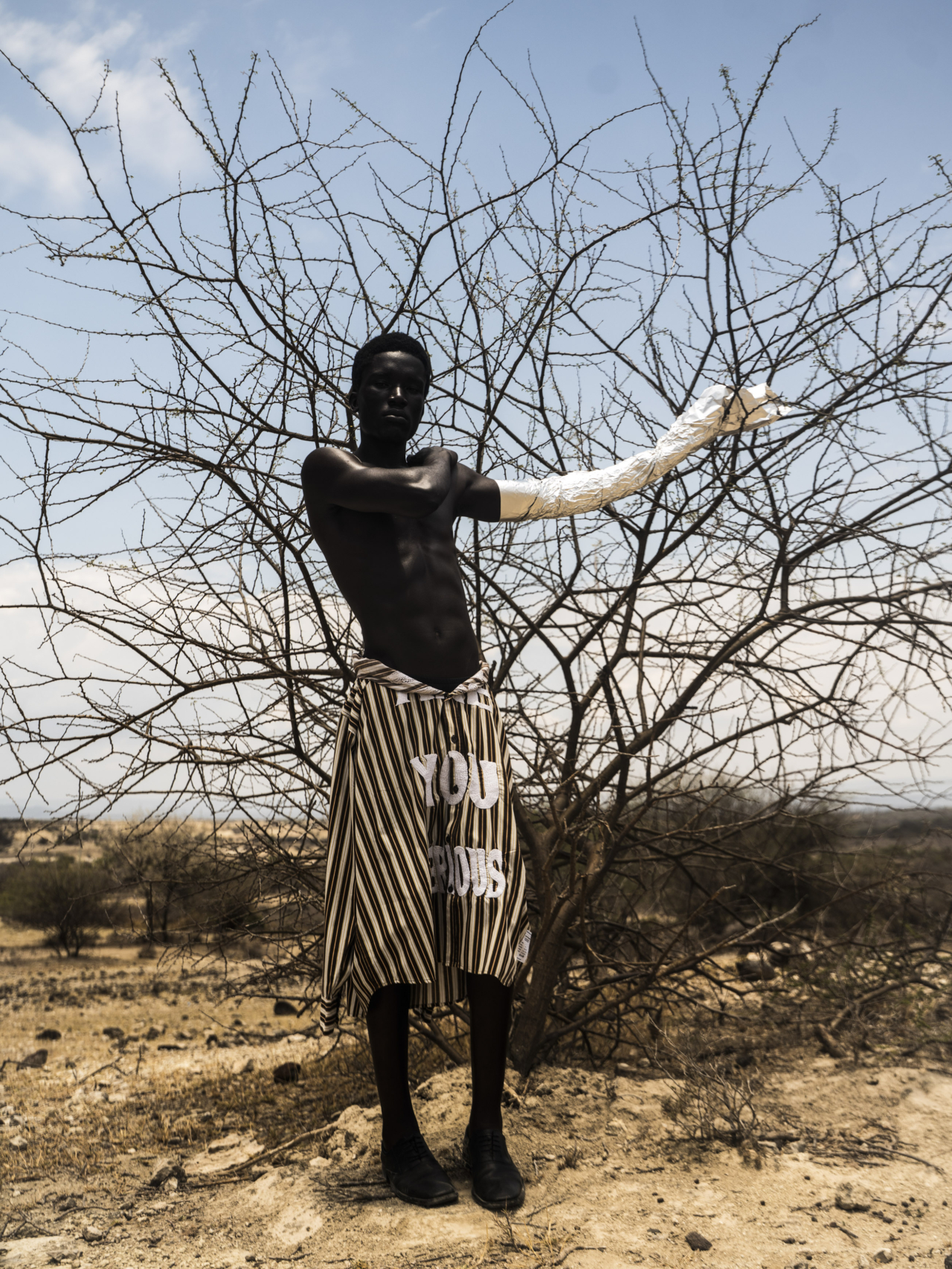
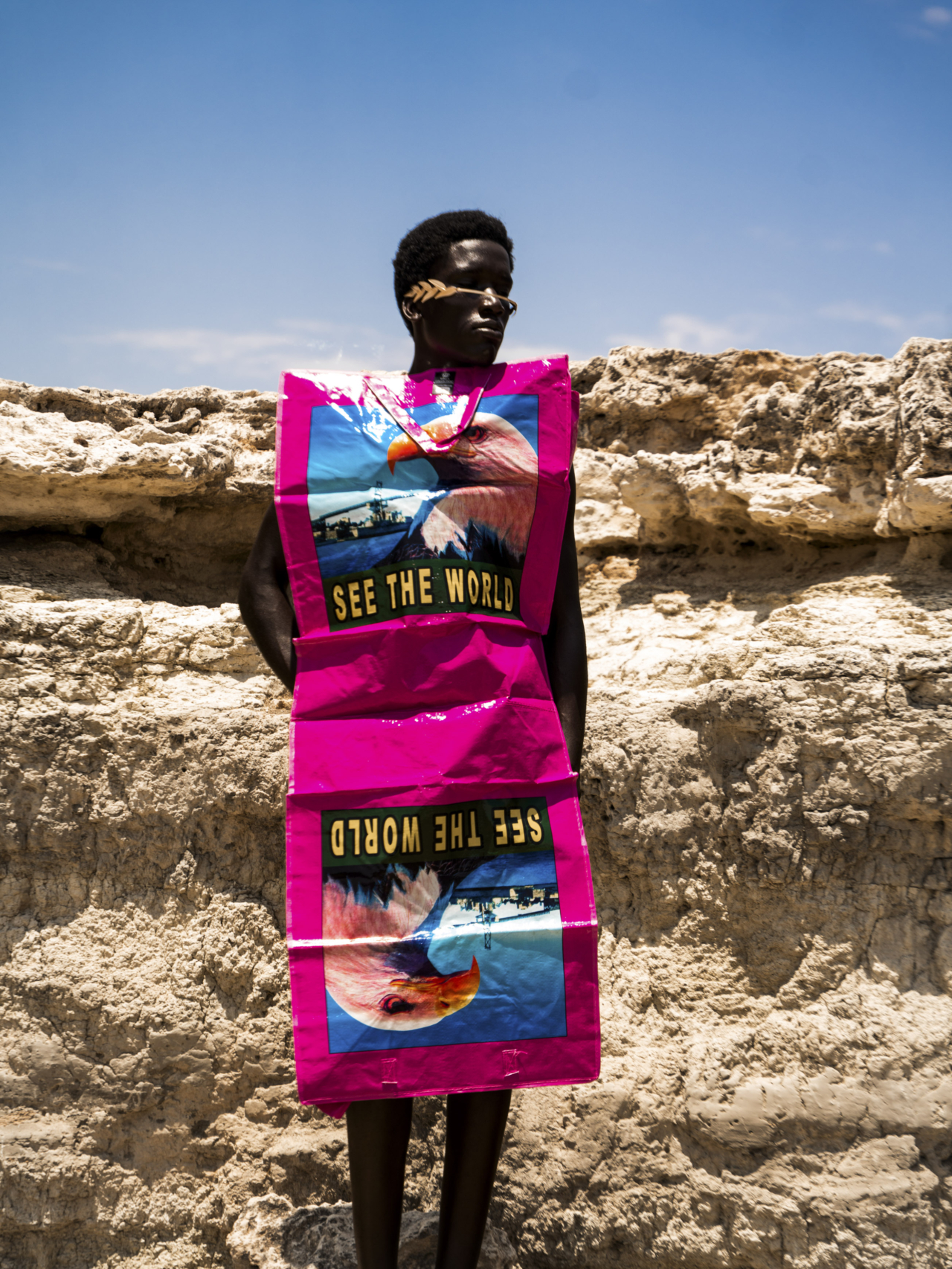
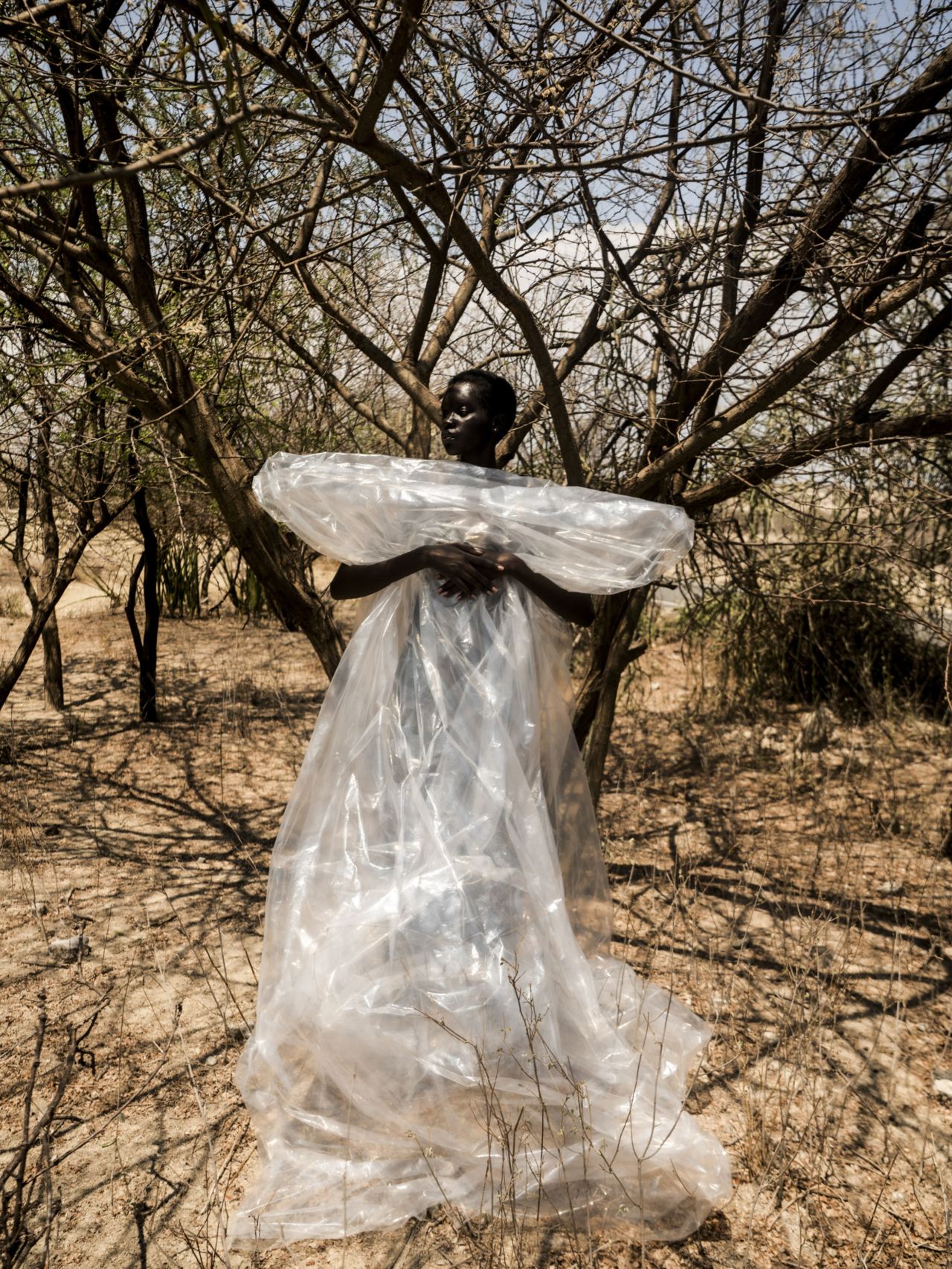
Achol wears Kennedy Mirema design
words by jake hall
photographs by shitanda
creative direction & styling by kennedy mirema
In 2016, designer Bobby Kolade was studying fashion in Berlin when he learned that East African governments were collectively calling for a ban on secondhand clothing imports.
Initially, Kolade was confused by the news. He grew up between Lagos and Kampala, with fond childhood memories of trawling Kampala’s enormous Owino market and finding a coveted Tommy Hilfiger jacket among other treasures. “I wasn’t thinking about the environmental impact of fashion,” he said. “Even in Berlin, I thought I was doing something good by dumping my clothes into the collection bin down the road.”
Kolade quickly learned that wealthy Western countries ship countless bales of textile waste, usually the garments passed up by thrift stores and NGOs, to countries across the Global South. These clothes are then sold to market traders operating in places such as Accra’s Kantamanto Market or Kampala’s Owino Market. The traders face the mammoth task of sorting sartorial trash from treasure to decide what they can sell at their stalls. But unsellable garments often have no place in existing waste management systems, ending up contaminating beaches and clogging drainage systems across the Global South. People who spoke with Atmos say this can account for anywhere from 20% to 50% of a bale’s content.
“The system is a work of evil genius,” Kolade said. “You overproduce and get your people to buy more. You make these crazy profits, and then you don’t even have to take care of the waste. You sell it off to a charity that sends it away, and you make money from that, too.”


When Kolade founded his own label, Buzigahill, back in 2022, he pioneered a new, subversive blueprint he calls “return to sender.” In practice, this means upcycling textile waste, creating beautiful garments from exported cast-offs. His latest collection features everything from bleached, frayed denim to a sculpted, biodegradable bustier made in collaboration with researcher Lyndah Katusiime, whose cassava starch-based bioplastic marks a sustainability breakthrough. In just three years, Kolade has established himself as one of the fashion industry’s most creative thinkers, building a team of skilled artisans in Kampala as he goes.
The last few years have seen Kolade’s ethos crystallize into a broader movement across the continent as African artists, designers, and activists transform fashion waste into a platform for creativity and climate justice. Many are pioneering new business models of community-based upcycling and production that challenge the global fashion industry’s dependence on overproduction and offloading.
One of its leading voices is Ghanaian designer and activist Yayra Agbofah, who spent his childhood wandering the stalls of Kantamanto Market. Only later, when he began working with the market’s traders, did he realize “this wasn’t just thrift, it was waste colonialism,” he said. “Ghana was becoming a dumping ground for the fashion industry’s excesses.”
In response, Agbofah established The Revival, an Accra-based nonprofit that tackles “textile waste through upcycling, education, and job creation.” The Revival hosts workshops to train local artisans, sells upcycled, one-of-a-kind pieces, and even supports the research behind eco-friendly material innovations, like the RevivalTex brick, made almost entirely from recycled textiles. Agbofah has become the charismatic face of the organization and a TED speaker campaigning against global inequality and textile waste pollution.


Getting to this point hasn’t been easy. “The biggest challenge is infrastructure,” Agbofah said. “There’s no formal waste management system for textiles in Ghana, so we had to start from scratch: building a space, creating a sorting system, and finding markets for upcycled products.” Then, there’s funding. “Sustainability work in the Global South is often underfunded, despite carrying the heaviest burdens of waste,” he said. It’s an unequal system propped up by what researcher Stefan Zylinski calls “neocolonial climate finance.” In a 2024 article, he argued that current funding models do more harm than good to economies already heavily burdened by the climate crisis.
Kolade knows the problem firsthand. His “return-to-sender” model is explicitly political—and he’s financially penalized because institutions struggle to classify his products as a result. “Under normal circumstances, a product that’s made in Uganda should enjoy preferential treatment in most trade blocs in the Global North,” he said. “But because the law doesn’t have a harmonized system code for upcycled clothing, our products don’t qualify as Ugandan. That’s because the raw material [textile waste] is from the Global North.”
That classification gap puts pressure on Kolade’s already-slim margins. Buzigahill is taxed as a Ugandan business, but its garments are treated as foreign-made when sold abroad. As a result, international customers face added VAT and import duties on top of the sale price. “A client ordinarily has to cover the costs, but nobody has time to go to the tax office to pick up a T-shirt,” he said, so Buzigahill covers the cost to make life easier for customers.
The East African proposal to ban secondhand clothing imports never passed, in part because of threats of sanctions from the United States. Kolade doesn’t believe a ban is the answer. In a 2023 Guardian essay, he wrote: “Painful as it is to acknowledge, secondhand textiles are a valuable source of tax revenue for our country. A ban is a vote for economic suicide.” Asked how he feels now, over two years later, he replied: “Our feelings are still the same, and nothing has changed.”

“In Ghana, circularity is survival: repairing, reusing, sharing, and innovating with what we have.”
Trade laws aren’t the only obstacle. Kolade also contends with the pace and inflexibility of the fashion industry itself. “Retailers and stockists need to embrace the fact that it’s possible to upcycle,” he said. “There’s this idea that designers should churn out 50,000 units of one style in three different colorways, but our fabrics won’t always be the same.” It’s a challenge that’s compounded by the worsening quality of secondhand clothing bales, he added. Buzigahill once bought bales directly from wholesale importers, but found that only about 60% of the material was usable. Now, a team combs the market daily for specific pieces and fabrics. “It’s more labor-intensive,” said Kolade. “But not knowing how much waste you’ll find in a bale presents a huge challenge to the business.”
Festival-goers at Denmark’s Roskilde Festival in July were confronted with hundreds of these clothing bales: colorful, plastic-wrapped bundles, which became the walls of an art installation. This was Return to Sender, a pointed commentary on the secondhand clothing trade by Nairobi-based art group The Nest Collective. Inside, attendees could experience a live soundscape and video, marking another stop on what has become a years-long tour of the artwork.
The Nest Collective, co-founded in 2012 by Sunny Dolat, is united by Dolat’s singular goal of “reclaiming and interrogating existing narratives and portrayals of Black African people.” The first iteration of Return To Sender appeared in 2021; the installation has since been shown in seven different countries. “For us, [the work] has always been both provocation and confrontation,” Dolat told Atmos. “It’s a moment of reckoning, where consumers in the Global North are made to see the afterlife of their clothes once they exit people’s homes and enter global trade systems.” Each re-creation of Return To Sender is made from bales bought locally, which are then returned to the local sellers. “This approach is integral to the work,” Dolat added. “It highlights that the problem is not abstract or distant, but already present in each city where the work appears.”


Installations like Return to Sender also play a key role in reshaping our relationship with clothes. “Since most clothing manufacturing has been outsourced to the Global South, consumers [in the Global North] are removed from the realities of garment production,” he said. “This distance erodes awareness of how resource- and labor-intensive clothing is to make, making it easier to treat garments as disposable.”
The labor behind fast fashion is undervalued and largely invisible, obscuring the countless steps behind a $3 Temu tank top—often featured in “clothing hauls” and discarded months, if not weeks, later. “There’s a kind of reprogramming that needs to happen, an urgent need to re-establish a more thoughtful, less disposable relationship with clothing,” Dolat added.
Buzigahill, The Revival, and The Nest Collective are part of a growing artistic movement rooted in sustainable, justice-centered alternatives to the current exploitative system. By intercepting and upcycling waste, they’re enriching local economies and carrying forward legacies of craft.
“In Ghana, circularity is survival: repairing, reusing, sharing, and innovating with what we have,” said Agbofah. That survival was threatened earlier this year when a fire devastated Kantamanto Market. Agbofah led fundraising efforts, and confirms that “rebuilding is underway, though it’s slow and challenging.” Traders are still recovering while pressing for structural improvements. This includes better fire safety measures, stronger infrastructure, and social protections, so that “the market can rebuild stronger, not just return to the same vulnerabilities,” Agbofah said.

Kolade, meanwhile, continues to push Buzigahill forward despite opposition. In addition to slowly building a sustainable fashion brand, he’s creating a political movement that puts today’s system of waste colonialism under scrutiny. His end goal is nourishing a new ecosystem of creatives across the Global South. It’s urgent work. Overconsumption isn’t showing signs of slowing. If anything, fast fashion is getting faster.
Even so, Kolade is optimistic about the future. As Buzigahill grows, he says, he can “experiment and come up with new ideas,” working with tailors and artisans to flex their creative muscles. Kolade is also in constant dialogue with major industry players, pushing for a more just, circular way of working. Long-term, that means lobbying for changes to antiquated trade laws and redressing structural inequalities that underpin the global fashion system. Day to day, it means building a team committed to his return-to-sender ethos and testing new frameworks.
“That’s the beauty of upcycling,” he said with a smile. “The options really are limitless.”


talent Triva Nyagol, Achol Yukwan Set assistant Vanessa Wesh Select Clothing Buzigahill
Join our membership community. Support our work, receive a complimentary subscription to Atmos Magazine, and more.
The World Sends Its Old Clothes to Africa. These Designers Are Sending a Message Back.









